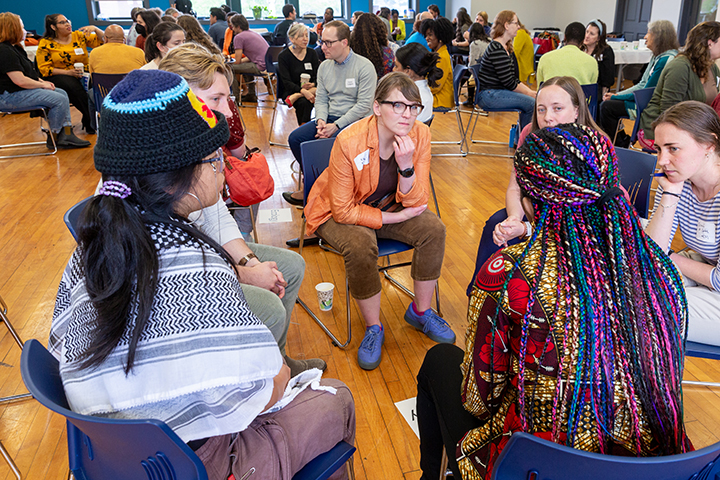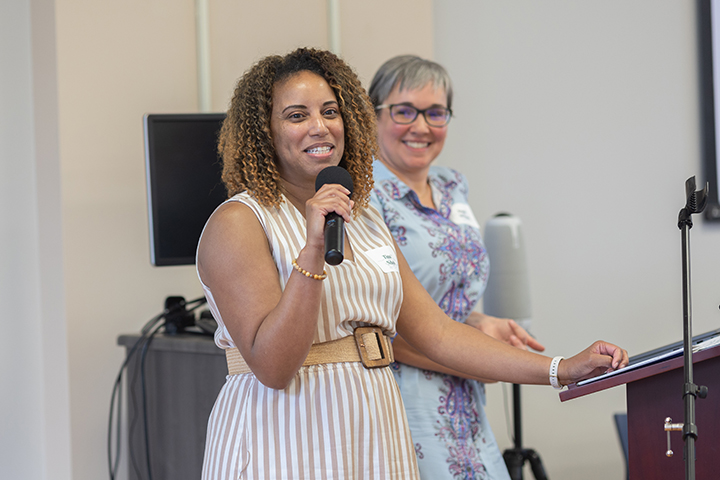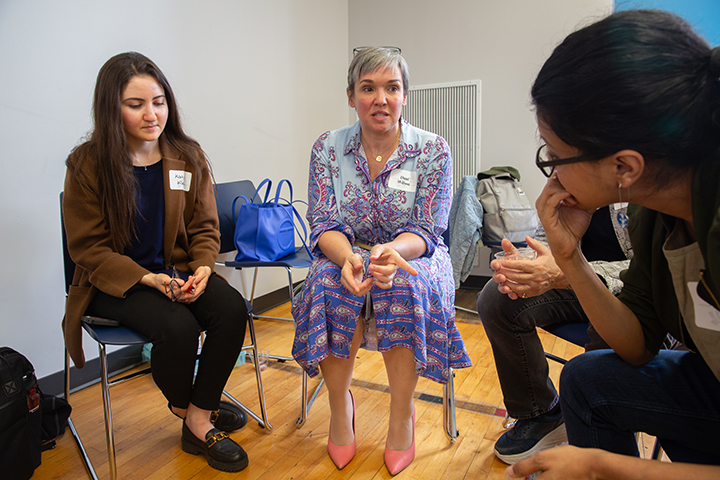Hosting a three-day workshop on environmental justice after a few brief months of planning is not something many would associate with happiness or laughter, but that’s how the event was described by its conveners – Tina Ndoh, PhD, associate professor of environmental and occupational health at Pitt’s School of Public Health, and Dani Wilson, MSW, executive director of the Cancer and Environment Network of Southwestern Pennsylvania.
Ndoh and Wilson met in January to begin planning the “Environmental Justice Summit: Reflections, Connections, and Collaborative Action,” which was held May 9-11 at Pitt’s Community Engagement Centers in Homewood and the Hill District, as well as additional locations in Hazelwood and Clairton.
The summit, attended by more than 100 community members and academics, was the first such event in Pittsburgh to engage scholars, community members and practitioners in the topic of environmental injustice and to offer healing activities – cooking lessons, how-tos in making non-toxic household cleaners and self-care products, and art therapy – for Black communities and others disproportionately burdened by environmental toxins and hazards.

“It was a lot of hard work for our planning committee, like birthing a baby,” laughs Ndoh, also associate dean for public health practice. “But there was also just so much joy expressed, which I think had to do with creating a space for people to tell their stories and to connect with like-minded partners.”
Registration filled in a mere two weeks, which Wilson attributed to a profound need for “spaces where people can pause for community connection and care.”
When she first relocated to Pittsburgh from Durham, North Carolina, Ndoh viewed herself as a resident on a “tiny island of environmental justice scholars,” yet remained keenly interested in developing a one-day environmental justice symposium, despite some uncertainty about how to move forward. Likewise, Wilson and her network colleague, Andre Green, MSW, who received funds from The Heinz Endowments and The Pittsburgh Foundation to host an environmental justice meeting, were questioning how to do so while providing a space for healing. When the two women connected, everything came together.
“From the moment we discussed combining our projects, Tina was such a strong believer in doing something for the community, as well as academic partners,” says Wilson. “She was excited to combine these in a way we hadn’t really seen much of before.”

Their next step was framing the concept of environmental justice to invigorate collective action and celebrate participants. “We were very intentional from the start in making sure the event was community-voiced and community-focused,” says Ndoh.
They also wanted to emphasize environmental justice as an ethical issue. “It really is about creating the environment we all deserve,” says Wilson.
Part of this understanding comes from the idea of healing justice, which seeks to respond to generational trauma and regenerate traditions of liberatory practices that have been lost or stolen, explains Wilson. The topic was “brought home” at the summit through a Bearing Witness ceremony, in which participants convened at the home of Melanie Meade, who lives adjacent to the U.S. Steel Clairton Coke Works.
Meade invited participants to see and breathe the air that she and her son breathe, which led to discussions about anger, fear, exhaustion and grief, and a closing ceremony that inspired solidarity, says Wilson.
“There are so many structures that keep us disconnected from the environmental health work that we do,” says Ndoh, reflecting on the Bearing Witness event. “These same structures keep folks who don't experience environmental injustices on a regular basis from witnessing what is happening to others.”
Believing those most impacted by environmental injustices should lead post-summit discussions, Ndoh and Wilson are passing the torch on to the Black Environmental Collective (BEC) as that organization convenes follow-up conversations later this month.
“We are excited to host the post-symposium conversations to keep the momentum going regarding environmental justice and healing,” says BEC Director Alyssa Lyon, MPM. “Keeping the lines of communication open will continue to create pathways for solution sharing and mutual learning for all who actively participate in environmental initiatives.”
Ndoh and Wilson, who will continue to provide support, agree. “It’s really important that we operate from a place of love and healing,” says Wilson. “It’s about sharing understanding and slowing down to create spaces to heal.”

-Clare Collins
_____________________________________________________________________________________
The Environmental Justice Summit was sponsored by the Cancer and Environment Network of Southwestern Pennsylvania, the University of Pittsburgh Center for Health, Environment and Engaged Research, the University of Pittsburgh Mascaro Center for Sustainable Innovation, the University of Pittsburgh Health Policy Institute, the Heinz Endowments and the Pittsburgh Foundation.